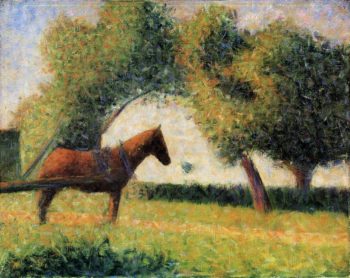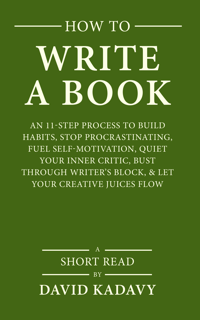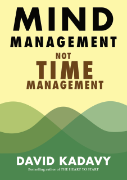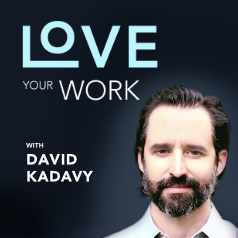Subscribe to blog updates via email »
Respect The Four Stages of Creativity – Love Your Work, Episode 218

When I was writing my first book, Design for Hackers, I developed a ritual. I would lay all of my research materials on the floor. Graphic Design history books were splayed out. I had research papers or articles printed out and stapled. There were highlights and sticky notes everywhere.

WANT TO WRITE A BOOK?
Download your FREE copy of How to Write a Book »
(for a limited time)
In the center of all of this, I had a whiteboard. Well, it wasn’t actually a whiteboard. Whiteboards were too expensive. It was a piece of tile board — tile board is what you would use for the wall inside of a shower. A whiteboard can go for more than $100. I bought this piece of tile board at The Home Depot for $11.
It looked like a scene from a movie. I was the detective, trying to catch the killer. Where had the killer struck before? Is there a pattern to the killer’s behavior? Where will the killer strike next? My living room looked like a detective’s office.
If a friend invited me out to do something, I would tell them a lie. I would say I couldn’t go out.
But that wasn’t the lie.
- Listen in iTunes >>
- Download as an MP3 by right-clicking here and choosing “save as.”
- RSS feed for Love Your Work
“Writing” doesn’t always mean writing
Saying I couldn’t go out while I was kneeling over my research material on my living room floor wasn’t the lie. I really didn’t have much time for socializing while writing my first book.
The lie was that I would say that I was writing. In actuality, I would do little, if any, writing during this evening ritual.
I might scribble a note here or there. I’d write one or two-word concepts on sticky notes, and arrange them on the whiteboard by feel. I’d draw lines amongst the sticky notes. I might even sloppily squeak an outline onto the whiteboard with a marker.
But nothing I produced on these nights had any hope of showing up in my book. My computer was nowhere to be seen. I hid it in another room. Writing? I wasn’t really writing, per se.
The speech that changed the way we see creativity
In 1891, German scientist and philosopher Hermann von Helmholtz celebrated his 70th birthday. At the party thrown in his honor, he rose to give a speech. He reflected on his illustrious career.
He had achieved one groundbreaking discovery after another. In physics, he formulated the concept of energy conservation. In art, he devised theories on color perception that influenced Impressionist painters. In medicine, he invented the ophthalmoscope.
But Helmholtz was about to make one more contribution, this time to our understanding of creativity. He said:
[Inspiration] comes quite suddenly, without effort, like a flash of thought. So far as my experience goes it never comes to a wearied brain, or at the writing-table. I must first have turned my problem over and over in all directions, till I can see its twists and windings in my mind’s eye, and run through it freely, without writing it down; and it is never possible to get to this point without a long period of preliminary work.
And then, when the consequent fatigue has been recovered from, there must be an hour of perfect bodily recuperation and peaceful comfort, before the kindly inspiration rewards one. Often it comes in the morning on waking up…. It came most readily…when I went out to climb the wooded hills in sunny weather.
It wasn’t until years after I wrote my first book that I discovered this passage. But when I did, my experience writing that first book came back in a flash.
Research becomes writing
No, I wasn’t “writing” during these evening research sessions. Not in the sense that my fingers were moving on a keyboard, and that words were appearing on a screen.
Yet I had come to learn that this work I had put in the night before would pay off the next day.
The next morning, I’d amble across the creaky hardwood floor, sit down in a chair, and put my fingers on the keyboard.
The notes from the night before were nowhere to be seen. The books were back on the shelf, the sticky notes were in the trash, and the whiteboard — okay, tile board — was erased and stowed away.
I eventually learned that those nighttime research sessions made all of the difference. Even though my notes were nowhere to be seen, the success of my morning writing session depended entirely on whether I had taken the time to immerse myself in my source material.
If I hadn’t done my ritual, my writing session was agony. A dull pain would form in my stomach. My shoulders would round forward. My knuckles would tighten and my fingers would turn into claws. I’d struggle to get anything out.
But if I had done my ritual, it was different. As if by magic, my fingers would move on the keyboard, and words would appear on the screen. Now, I really was “writing.”
So when I heard about Hermann von Helmholtz’s speech, it all made sense. This was why I had settled into this pattern. This was why I had learned to perform this ritual with a whiteboard, sticky notes, and books strewn about the floor.
I had been “[turning] my problem over on all sides.” When it came time to write, it didn’t matter whether I kept my notes. The “angles and complexities” were now “in my head.”
I couldn’t go straight from research into writing. I had a “wearied brain.” Instead, I needed to wait until the morning, my “hour of perfect bodily recuperation and peaceful comfort.” That’s when the writing would finally come easily.
You fall flat when you try to power through creative blocks
Helmholtz’s speech probably brings back memories for you, too. You remember times when you felt hopelessly blocked. You were writing a report, designing a logo, or trying to make a tough life decision.
You gathered all of the information you could, and racked your brain for a solution. You panicked, certain you would never gain clarity. You began to question your abilities. You may even have questioned your right to exist.
But then, seemingly out of nowhere, the solution appeared. This time, the writing flowed, the perfect logo appeared in your mind, or that decision that was once unclear suddenly became obvious.
It might have happened when you sat down to take another crack at the problem, but more often it happened somewhere else. You were taking a shower, you were playing catch with your kid, or you were waiting at the check-out counter at the grocery store.
Wallas’s “Four Stages” of creativity
Social psychologist Graham Wallas also related to Helmholtz’s speech. Thirty-five years after the fact, he formalized Helmholtz’s observations on the creative process into what he called four “stages of control.” These four stages make the random and mysterious creative process seem a little less random and mysterious.
- The first of the four stages is Preparation. During Preparation, you’re learning everything you can about the problem. As Helmholtz would say, you turn it “over and over in all directions,” until you “can see its twists and windings” in your mind. You know it so well that you don’t even need to refer to your notes in order to talk about it or to brainstorm solutions.
- The second of the four stages is Incubation. Incubation is the period during which the “consequent fatigue” of the Preparation stage reaches the point of “[having] been recovered from.” Incubation happens any time you aren’t actively working on the problem. You could be working on something else, taking a walk, or even sleeping.
- The third of the four stages is Illumination. Illumination is the “aha” moment — the moment neuroscientists would call insight. It’s when the solution comes “quite suddenly.” It’s a “flash of thought,” that arrives “without effort.” The moments of Illumination are the moments that make creativity seem so mysterious, because they are sudden and unpredictable. Your breakthrough idea may come while making breakfast, clipping your toenails, or “[climbing] the wooded hills in sunny weather.”
- Finally, Wallas suggested a fourth stage, which wasn’t mentioned in Helmholtz’s speech. Verification is when you evaluate the idea you arrived at during the Illumination stage. You make sure your calculations add up. You check your facts and correct your grammar. You put the finishing touches on your masterpiece.
So, the four stages of control — which scientists widely refer to as the four stages of creativity — are Preparation, Incubation, Illumination, and Verification. More than 120 years later, Helmholtz’s observations still stand up. With Google Scholar returning more than 6,000 articles citing Wallas’s four stages — mentioning these stages is practically a requirement for any research paper on creativity.
Respect the Four Stages of creativity
Within the first few months of writing my first book — though I didn’t know it at the time — I had discovered the power of working with these stages. Though I knew that I wouldn’t write a single useful word in my evening research session, I was okay with that. I had tried enough times to sit down and write without doing a deep dive like this first, and it was painful enough that I never wanted to do it again. I knew that somehow, the things I explored tonight would connect together tomorrow.
Furthermore, I knew that the things I wrote the next morning wouldn’t be ready for print. There would be awkward sentence structures, unnecessary explanations, or things I’d need to look up one last time.
My research session would be my Preparation, my night’s sleep would provide Incubation, and my morning writing session would bring Illumination. Later — when I edited my writing — I would do my Verification.
By being comfortable working according to the four stages, I had reduced the pain of writing. Since it was no longer painful, I was less likely to procrastinate. Since I knew not to push too hard to reach a solution, I stopped burning out.
If you’re going to make it as a creative, this is the most important thing to remember, and it’s easy to lose sight of it in our results-driven world: If you are going to do creative work, you have to respect the Four Stages of creativity.
Too often, we expect to reach creative solutions right away. We expect to sit down, and learn a few things about the problem. And then we expect the perfect solution to come to us.
We stare at the blank canvas. We cower in front of the blinking cursor. We agonize over the tough decision. And the fact that we can’t make any progress at all certainly doesn’t help the matter.
So, respect the Four Stages: Preparation, Incubation, Illumination, and Verification. Don’t expect a solution if you haven’t immersed in the source material — you haven’t done the Preparation. Don’t hope for a creative miracle if that source material hasn’t had a chance to sink in — it hasn’t gone through Incubation. And when you do put pen to paper, brush to canvas, or bow to string, don’t expect what comes out to be worthy of Carnegie Hall or the Louvre. You’ll still have to do your Verification.
The world we live in doesn’t respect the Four Stages. People call brainstorming meetings where they expect to reach a solution. Movies show songs being composed in a flash of inspiration. And each of us, from time to time, gets burnt out, because we tried to power straight through a creative block.
Now that you know this little secret, just to make things easier, every once in awhile, you might have to tell a little “lie.”
Image: Horse and Cart, Georges Seurat
My Weekly Newsletter: Love Mondays
Start off each week with a dose of inspiration to help you make it as a creative. Sign up at: kadavy.net/mondays
Listen to the Podcast
- Listen in iTunes >>
- Download as an MP3 by right-clicking here and choosing “save as.”
- RSS feed for Love Your Work
Theme music: Dorena “At Sea”, from the album About Everything And More. By Arrangement with Deep Elm Records. Listen on Spotify »


